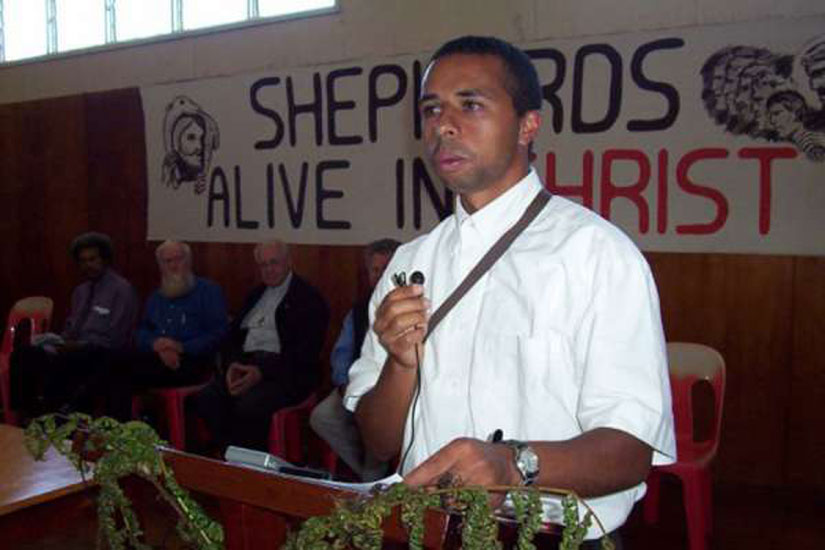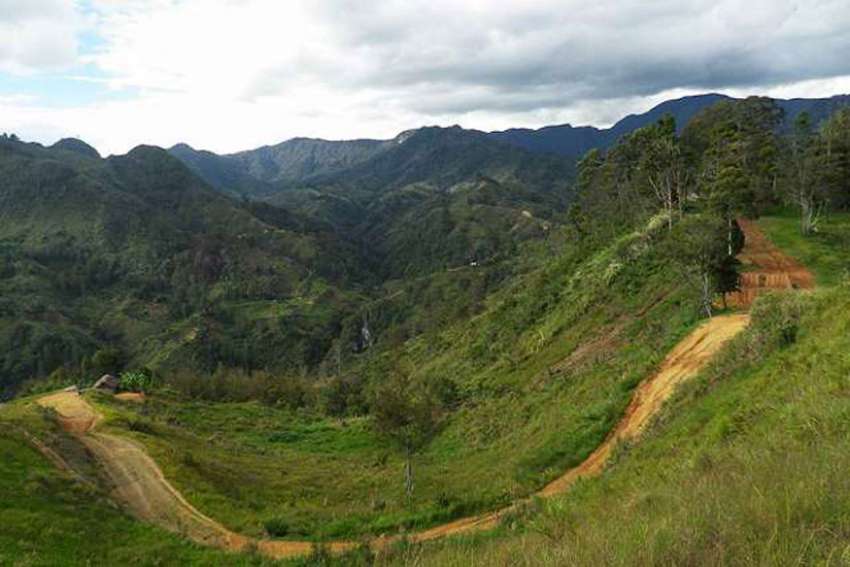“These people live in a difficult and rugged terrain. God has put them there. It is their home. All the material used to build their church was carried by their grandfathers on their shoulders. They are proud to have the presence of the Church in their area,” said Fr. Christian Sieland of the Kundiawa Diocese of Papua New Guinea.
“Many have only a few pieces of clothes or just enough money to get through the week. They may be poor, but they acknowledge all the blessings God has given them,” Fr. Sieland told CNA.
“They don’t starve because God has given them a fertile soil where almost everything can be grown. They don’t thirst because God has given them clean and fresh mountain streams nearby to fetch water from.”
The priest had high praise for the hospitality of these Catholics.
“When I as their parish priest go into their homes for a visit or even stay overnight with them, they give me the biggest plate full of food, they let me sleep in their best beds under mosquito nets. The care and respect given to a priest in those remote areas sometimes really touches me and makes me at times even feel embarrassed,” he said.
“But how can you refuse such gestures of hospitality from simple believing people? They don’t have much to offer, but when they offer you the little they have, it comes from deep within their hearts.”
About 30 percent of the diocese’s 375,000 people are Catholic. The diocese’s territory includes Mt. Wilhelm, the country’s highest mountain at nearly 14,800 feet. Some parts are so remote that people have never seen a car.
Fr. Sieland reflected on his mission.
“My motivation is simple. If I as an ordained priest don’t go to these people, who else will?” he asked. “Wasn’t I ordained for this purpose, namely to bring the sacraments to the people and to nourish them with spiritual food, i.e. the Word of God, and the Eucharist? No priest means no Eucharist, no confession, no sacraments at all. If I don’t go, then I am depriving them of their God-given right to receive all the spiritual food and blessings.”
“How am I going to justify myself before God for not ‘feeding his lambs, tending his sheep and feeding his sheep?’,” he said, citing Jesus’ words to St. Peter.
 Fr. Christian Sieland speaks at a conference in Papua New Guinea. (CNA photo/courtesy of Fr. Christian Sieland)
Fr. Christian Sieland speaks at a conference in Papua New Guinea. (CNA photo/courtesy of Fr. Christian Sieland)
“Even if there were only 10 old people to be visited, I would still walk and climb the mountains and cross the rivers to be with them.”
The Papua New Guinea government has not been to the region in more than 40 years, since independence in 1975.
“But the Church has been there ever since the first missionaries from the Society of the Divine Word started to evangelize the people in the early 1930s and 1940s,” Fr. Sieland said.
“When you see the simple and yet deep faith of the people, and compare it to your own belief which is adorned with certificates, diplomas and degrees, then you begin to appreciate the simple faith of the ‘little ones’ all the more.”
In recent decades, permanent churches have been built. The Catholic Church in Papua New Guinea is transitioning from a missionary phase, though some changes have come too soon.
“Traditional and western modern values are clashing right now and the younger generation seem a bit lost or confused,” Fr. Sieland said. “Good traditional values that are similar to certain Gospel values are slowly disappearing. In 20 years’ time they will be gone for good.”
The numbers of foreign missionaries, especially from Europe, have dropped considerably. Even with the help of missionaries from Australia, Poland, India, and Indonesia, local clergy still cannot staff all the areas their predecessors vacated.
“Most of the Catholic parishes cover huge areas,” the priest reported. “Even in the remotest of areas, you will find a small Catholic Church building and maybe even an elementary or primary school and an aid post.”
The priest said that the government should be providing basic services, but the churches have had to fill the gap.
Despite efforts to promote Catholic values at parish schools, the country still faces many challenges posed by western lifestyle, mobile phone technology and internet access.
“One of the greatest challenges is the loss of Gospel values such as honesty, transparency, respect, love, commitment and dedication in family, in marriage, in the parish, at school, outside of school,” Fr. Sieland said.
Many teachers lack a stable marriage life and face problems with debt or alcohol. Some mismanage the schools’ money. Many students, for their part, disrespect teachers and some use alcohol or marijuana, often affecting their performance at school.
There are also major problems deeply rooted in Melanesian culture. Polygamous relationships have proved very hard to eradicate. There is also a clash between Christianity and traditional beliefs about sorcery.
“If people get sick and die, especially if they are a young, energetic and educated persons, people speak of ‘sanguma’ or sorcery,” the priest said. “We still have a lot of sorcery related violence and killings in Papua New Guinea, especially in our own province.”
“The local church tries everything to challenge this kind of belief, educate the people and eradicate belief in sorcery, but it won’t happen just from one day to the next. It takes time.”


